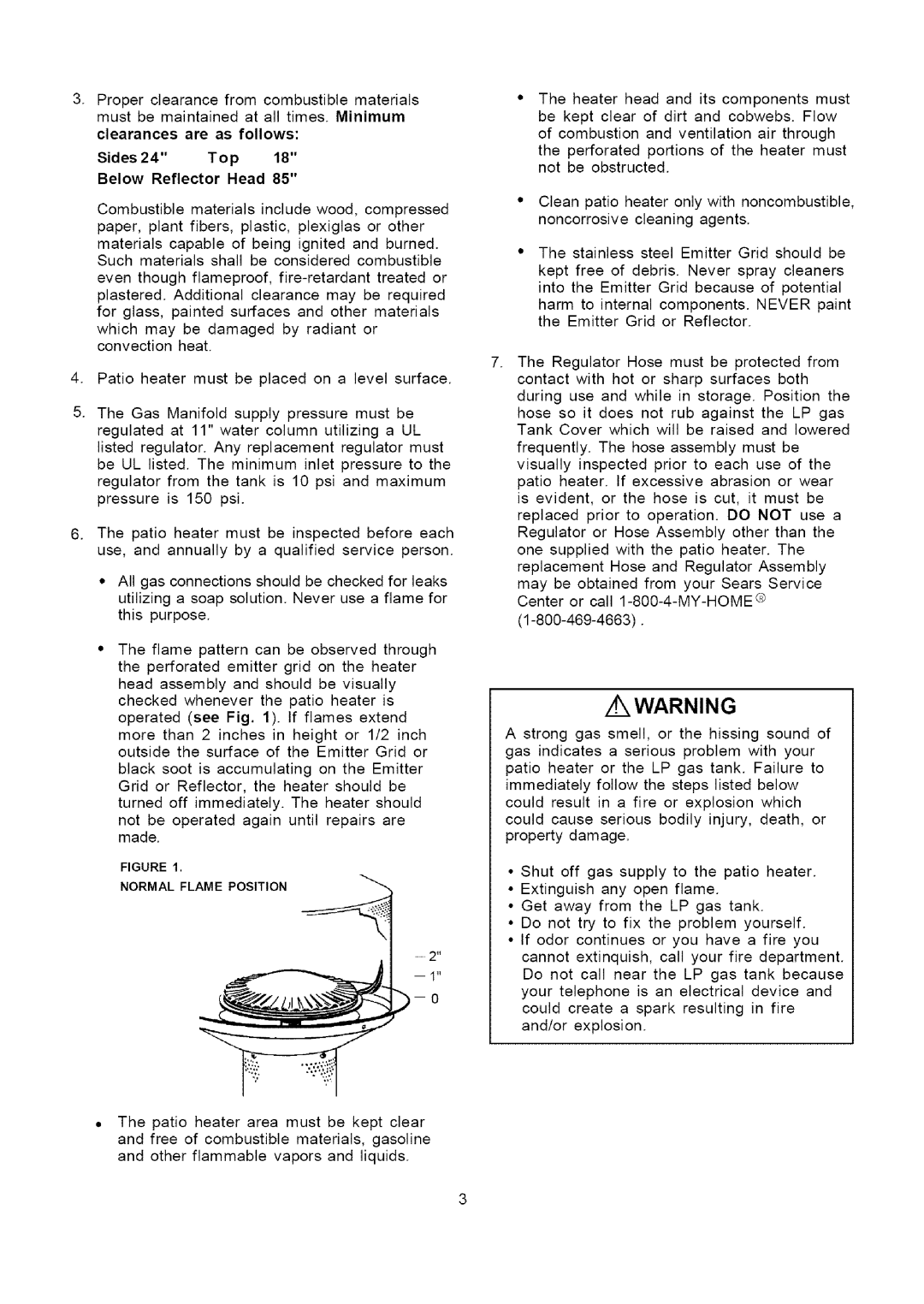
3.Properclearancefromcombustiblematerials mustbe maintainedat all times.Minimum
clearances are as follows:
Sides 24" Top 18"
Below Reflector Head 85"
Combustible materials include wood, compressed paper, plant fibers, plastic, plexiglas or other
materials capable of being ignited and burned. Such materials shall be considered combustible
even though flameproof,
which may be damaged by radiant or convection heat.
4.Patio heater must be placed on a level surface.
5.The Gas Manifold supply pressure must be regulated at 11" water column utilizing a UL listed regulator. Any replacement regulator must be UL listed. The minimum inlet pressure to the regulator from the tank is 10 psi and maximum pressure is 150 psi.
6.The patio heater must be inspected before each use, and annually by a qualified service person.
•All gas connections should be checked for leaks utilizing a soap solution. Never use a flame for this purpose.
The flame pattern can be observed through the perforated emitter grid on the heater
head assembly and should be visually checked whenever the patio heater is operated (see Fig. 1). If flames extend more than 2 inches in height or 1/2 inch outside the surface of the Emitter Grid or black soot is accumulating on the Emitter Grid or Reflector, the heater should be turned off immediately. The heater should not be operated again until repairs are made.
FIGURE 1.
NORMAL FLAME POSITION
2"
__ 1 II
0
The patio heater area must be kept clear and free of combustible materials, gasoline and other flammable vapors and liquids.
The heater head and its components must be kept clear of dirt and cobwebs. Flow of combustion and ventilation air through the perforated portions of the heater must not be obstructed.
Clean patio heater only with noncombustible, noncorrosive cleaning agents.
The stainless steel Emitter Grid should be kept free of debris. Never spray cleaners into the Emitter Grid because of potential
harm to internal components. NEVER paint the Emitter Grid or Reflector.
. The Regulator Hose must be protected from contact with hot or sharp surfaces both during use and while in storage. Position the
hose so it does not rub against the LP gas Tank Cover which will be raised and lowered
frequently. The hose assembly must be visually inspected prior to each use of the patio heater. If excessive abrasion or wear is evident, or the hose is cut, it must be replaced prior to operation. DO NOT use a Regulator or Hose Assembly other than the one supplied with the patio heater. The replacement Hose and Regulator Assembly may be obtained from your Sears Service Center or call
/f WARNING
A strong gas smell, or the hissing sound of gas indicates a serious problem with your patio heater or the LP gas tank. Failure to immediately follow the steps listed below could result in a fire or explosion which could cause serious bodily injury, death, or property damage.
•Shut off gas supply to the patio heater.
•Extinguish any open flame.
•Get away from the LP gas tank.
•Do not try to fix the problem yourself.
•If odor continues or you have a fire you cannot extinquish, call your fire department. Do not call near the LP gas tank because your telephone is an electrical device and could create a spark resulting in fire and/or explosion.
